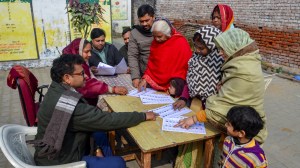Thank you, Mr Home Minister
Home Minister L.K. Advani deserves to be congratulated for having opened the door on Kashmir. I hope I am not letting down confidences, bu...

Home Minister L.K. Advani deserves to be congratulated for having opened the door on Kashmir. I hope I am not letting down confidences, but the step is something North Block with the Prime Minister8217;s support had been considering for quite some time, well ahead of President Clinton8217;s visit. A huge chunk of very constructive agenda was, in fact, derailed by the Christmas week hijack of the Indian Airlines plane. The Home Minister has decided to pick up the thread now.
What the government has initiated is, in fact, a process setting our own house in order in Kashmir. No one must have any illusions that this is going to be an easy process. It is going to be a long haul. After all, the past decade has been one of unspeakable tragedy for the people of Kashmir, trapped between terrorism exported from Pakistan and strong-arm measures to cope with the menace.
But have we mishandled Kashmir only during the past decade or have we been in error from the very beginning?
Since we are engaging our own people, the tone must be of absolute humility.One of the priceless documents I preserve in my library are Maulana Azad8217;s official letters in Urdu he wrote the letters in Urdu which his staff translated into English for official correspondence published in the original by Dr Rajesh Kumar Pruti, former director of the National Archives. Advani would find the correspondence very illuminating, particularly some of the letters relating to Kashmir.
In a letter written in 1953 to Jagjivan Ram, Union Minister for Posts and Telegraphs in Jawaharlal Nehru8217;s cabinet, Maulana Azad writes:
quot;My dear Jagjivan Ram, I had forwarded your letter regarding employment for Kashmiris in Posts and Telegraphs to Sheikh Abdullah, Chief Minister of Jammu and Ka-shmir. I am now sending you Sheikh Abdullah8217;s plaint.
quot;I find it difficult to understand that 43 applications from Kashmir are sent for petty, clerical jobs and only one is selected for employment. This kind of neglect has a very unsettling effect on the Kashmiri mind and ways in which it complicates the Kashmir issue is clearly not known to those in charge of recruitment in government departments.
quot;We are asked by the people that if Kashmiri Muslims cannot be given jobs in Communications and Defence, two of the three subjects controlled by the Government of India, then what hope is there for us when other subjects are passed on to the Indian Union?8221;
Maulana Az-ad then concludes the letter with a sharp question: quot;How do we respond to this complaint?quot;
I have dug up this letter simply to create the context for something I have personally experienced in Srinagar: an insatiable hunger for government jobs in Kashmir. Nothing has changed since 1953!
As you enter the government guest house on Jhelum, past armed soldiers and a series of barricades, the first ritual is to listen to the woes of the guest house staff who, after a spate of allegations against police quot;excessesquot;, pass you a list of application for jobs. I remember forwarding some of these to Ashok Jaitley, the chief secretary and Farooq Abdullah8217;s most trusted official. This was over a year ago. There is no progress on applications forwarded by me as in the case of hundreds of others received by the secretariat each day. I have dwelt on the quot;softquot; grievance of unemployment in the Valley in the best of times. Add to this the unspeakable levels of brutalisation and alienation that a decade of terrorism and counter-terrorism have left in their wake, and you have a valley seething with rage or simmering with discontent. This is the internal challenge Advani has to cope with.
The other challenge is diplomatic. What, for instance, is being done to rein in the Taliban taking instructions from Pakistan? The latest to speak out openly on this theme is Ahmad Shah Masood, leader of the Northern Alliance in Afghanistan. In an interview to Worldview India, the weekly international affairs programme to be telecast on Doordarshan on Sunday, Masood says: quot;As long as Taliban is totally in the hands of Pakistan, and has no independence of its own and until Pakistan8217;s policy in relation to the Afghan issue does not change, no agreement can be reached in Afghanistan. The most important issue in Afghanistan is not that Afghans are fighting against each other but it is the invasion of Pakistan in Afghanistan.quot;
So, Pakistan has all this on its plate. Sort out Afghanistan; stop trans-border terrorism in Kashmir before New Delhi can be convinced of Pakistani intentions and engage it in a dialogue. Meanwhile, the task being undertaken is to sort out the quarrel within the family, to repair the New Delhi-Srinagar equation.
- 01
- 02
- 03
- 04
- 05































